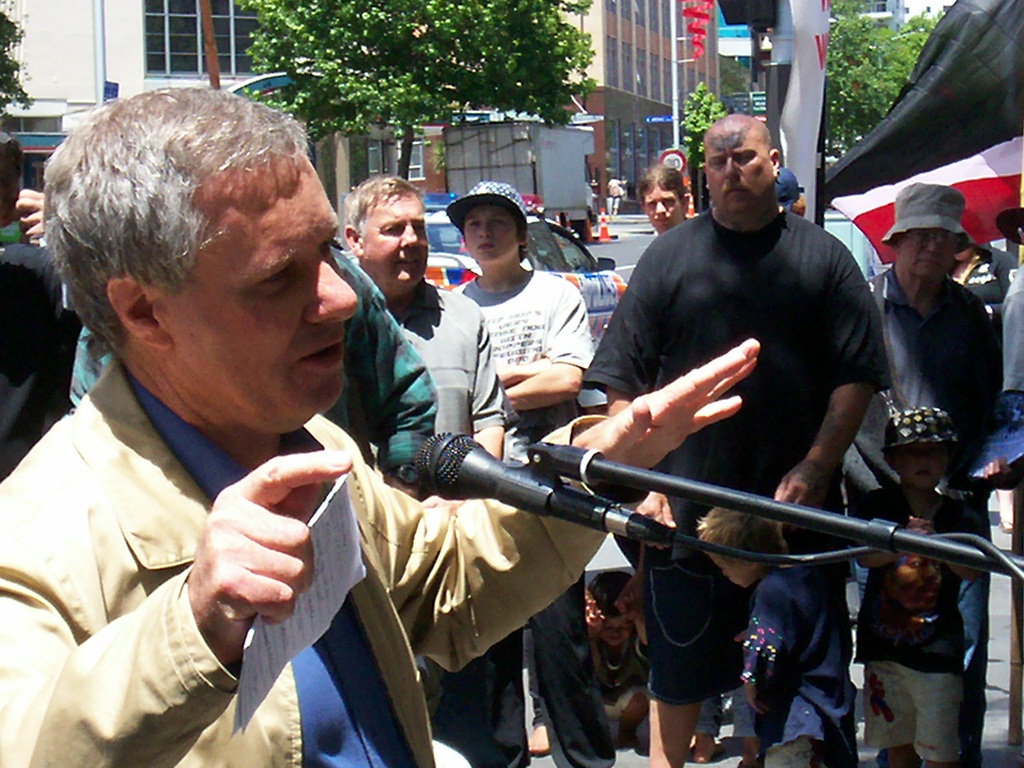Ian Anderson, member of Workers Party and The Spark editorial board. Originally printed in the October Spark.
 Recently Nick Maryatt, Green Party candidate for Hamilton East, suggested in a blog post that Labour voters were switching to the Greens because they are the “real opposition” to attacks by National. Maryatt is aligned with workers movement issues and has participated in the Hamilton Left Initiative, a non-sectarian left group which also involves members of the Workers Party. Radicals must develop a clear analysis of the Greens, given both their relationship to ruling-class parties, and with the left.
Recently Nick Maryatt, Green Party candidate for Hamilton East, suggested in a blog post that Labour voters were switching to the Greens because they are the “real opposition” to attacks by National. Maryatt is aligned with workers movement issues and has participated in the Hamilton Left Initiative, a non-sectarian left group which also involves members of the Workers Party. Radicals must develop a clear analysis of the Greens, given both their relationship to ruling-class parties, and with the left.
The Green Party of New Zealand first entered parliament in 1996 as a part of the Alliance, at that time a coalition of parties opposed to neo-liberalism. Green Party ideology was informed by international green politics, described in its most conservative parliamentary form by the recent slogan “some things are bigger than politics.” This means they would work with a range of forces, including ruling class parties, to achieve environmental reform.
Opposing neoliberal excesses, they drew both members and supporters from the radical left. In 1999 they independently won seven seats in parliament, including former Socialist Action League member Keith Locke and Workers Communist League member Sue Bradford. While Alliance went directly into coalition with the Labour Party, the Greens agreed to support this government. This set a precedent of orientation to the ruling class Labour Party.
Like many third parties, the Greens were easily caricatured as a strange mix. Rastafarian Nandor Tanczos, unemployed rights advocate Sue Bradford, anti-imperialist activist Keith Locke, united by a sometimes catastrophist, sometimes corporate, sometimes holistically social-democratic program. Their extensive industrial relations policy has long stayed to the left of the Labour Party, but in reality their impact depends both on their relationship to the major parties and what policies their MPs chose to push.
 Certain Green MPs act as parliamentary allies to left movements on the ground. Sue Bradford was instrumental in abolishing youth rates, and supported the Supersizemypay campaign which took the minimum wage to $12/hr, both campaigns run at street level by Unite Union with involvement from the radical left. Keith Locke acts as the acceptable parliamentary face of the anti-war and anti-imperialist movement.
Certain Green MPs act as parliamentary allies to left movements on the ground. Sue Bradford was instrumental in abolishing youth rates, and supported the Supersizemypay campaign which took the minimum wage to $12/hr, both campaigns run at street level by Unite Union with involvement from the radical left. Keith Locke acts as the acceptable parliamentary face of the anti-war and anti-imperialist movement.
However by forging alliances with ruling class organisations, the Green Party leadership are increasingly incapable of confronting corporate abuses. The Emissions Trading Scheme, a market measure which has internationally failed to curb emissions, also excludes major companies such as the New Zealand Refining Company. Under the Labour government the Refining Company signed a get-out clause excluding them from Kyoto regulations. Monopoly capital hinders environmental reform at every step; given their current involvement in the corporate Pure Advantage campaign, the Green Party leadership is not poised to challenge this.
Instead, the leadership became increasingly willing to punish working people for environmental abuses. In 1999, at the peak of the movement against water metering in Auckland, Green MPs such as Jeanette Fitzsimons joined the ranks of those opposing privatisation of water. However Fitzsimons does support charges on residential water, a corporate strategy guaranteed to punish families on low incomes. Similarly the Greens support petrol taxes and other consumer-focused strategies.
 As the leadership moves rightwards, signalling willingness to work with National to achieve environmental reforms, MPs are forced to shape up or ship out. Locke couches his criticism of imperialism in legality and appeals to the UN, even legitimising the role of “peacekeepers” in Afghanistan. Sue Bradford finally chose to shrug off the Sisyphean rock and leave parliament; it is telling that she reserved open acknowledgement of the problem for her valedictory speech, with the words “capitalism is not giving us the answers we need.”
As the leadership moves rightwards, signalling willingness to work with National to achieve environmental reforms, MPs are forced to shape up or ship out. Locke couches his criticism of imperialism in legality and appeals to the UN, even legitimising the role of “peacekeepers” in Afghanistan. Sue Bradford finally chose to shrug off the Sisyphean rock and leave parliament; it is telling that she reserved open acknowledgement of the problem for her valedictory speech, with the words “capitalism is not giving us the answers we need.”
As the majority of left groups gear up for another parliamentary experiment in supporting Mana, we must learn from this trajectory. It’s important to have allies and work with Green MPs and supporters on areas of common interest. However partnership with ruling-class bodies, including Labour and National, threatens to kill the revolution long before it starts.

Just another WordPress site
The only reason the Greens support a charge for water use for residential use is because of the social policies that would redistribute wealth to the poorest to the richest, through things like a $10,000 tax free zone and raising the minimum wage to 66% of the average wage (which is $16 at last calculation). The poor wouldn’t be punished because they wouldn’t be poor any more: the costs for water would well be offset by the added income support they get.
As for things like petrol taxes, the Greens simply don’t price and let the market sort it out, but rather use the money gain from the tax to make alternatives for the poor to use, like public transport and carpooling. After all, if we don’t do something to solve climate change we all know that it will be the poorest who will face the cost, as is already happening in the Pacific.
Thanks for your comment,
As I argue in the article, Greens have all sorts of leftish policies on paper that they don’t, won’t or can’t push in parliament. You’d be more likely to get support for further water metering from Labour or the Nats than for those sort of progressive taxation measures. To get anything like those sorts of reforms (which can be implemented under capitalism but generally with resistance from capital) a bit of fightback is required. Something I wrote on this earlier:
http://workersparty.org.nz/2009/12/14/climate-change-reform-or-revolution/
Anyway, residential water usage pales in comparison to corporate usage, and what limited water shortages we have in NZ (Kapiti) are more to do with infrastructure than residential overuse.
It’s a poll tax, not a conservation measure.